2024年中考英语二轮复习课件 介词(共18张PPT)
文档属性
| 名称 | 2024年中考英语二轮复习课件 介词(共18张PPT) |  | |
| 格式 | pptx | ||
| 文件大小 | 1.2MB | ||
| 资源类型 | 教案 | ||
| 版本资源 | 通用版 | ||
| 科目 | 英语 | ||
| 更新时间 | 2023-07-04 14:31:54 | ||
图片预览

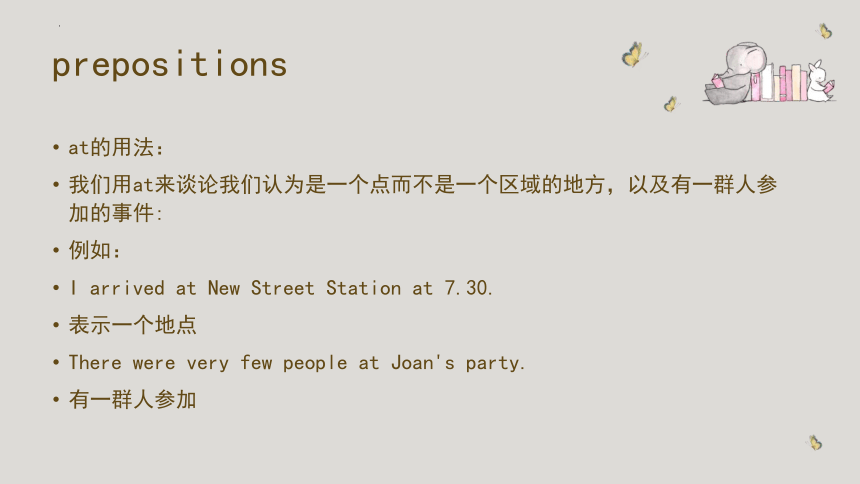
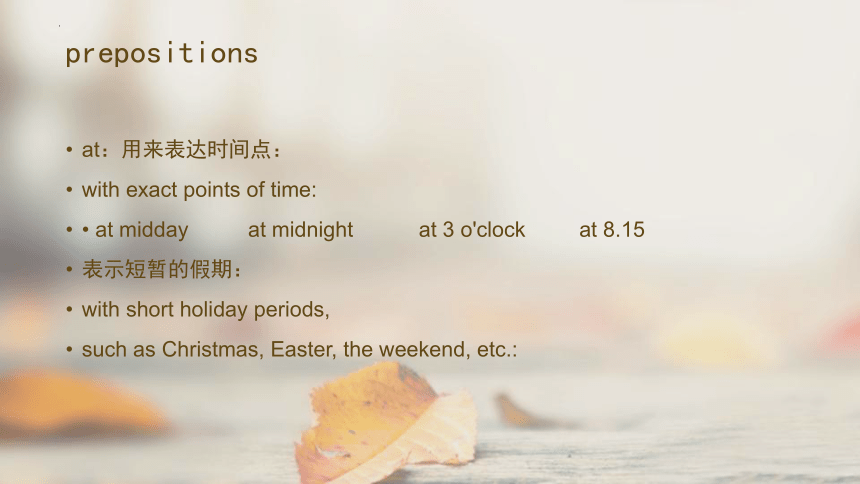
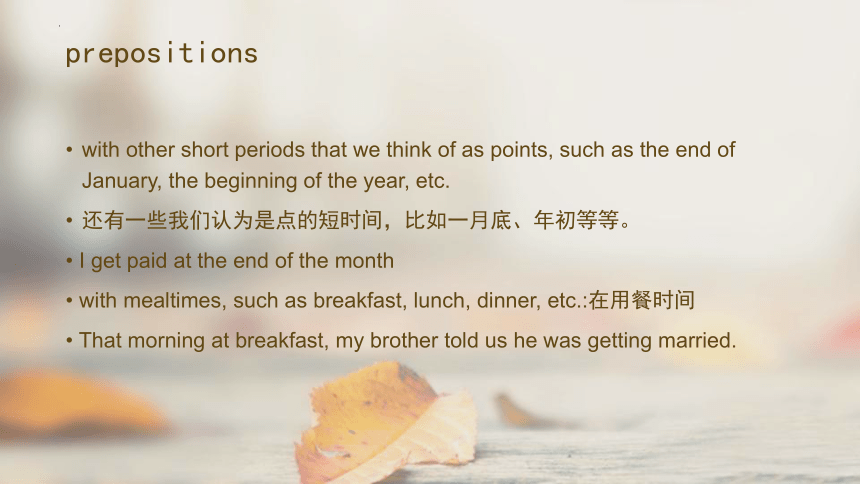
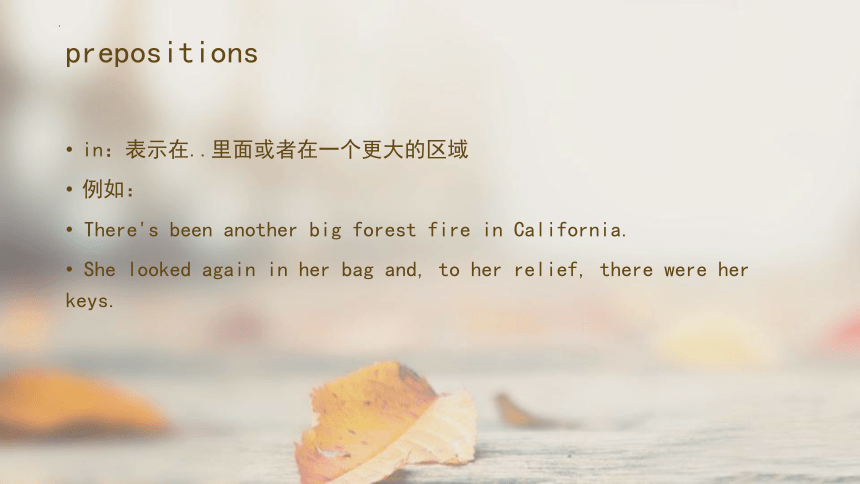
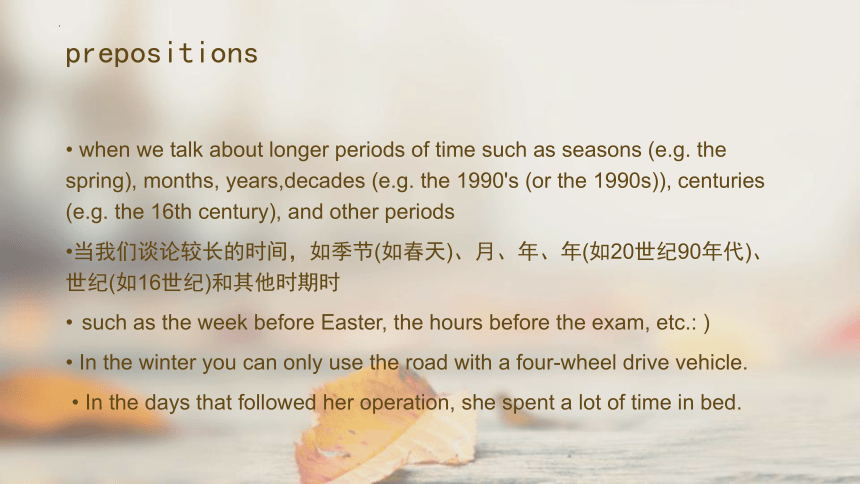
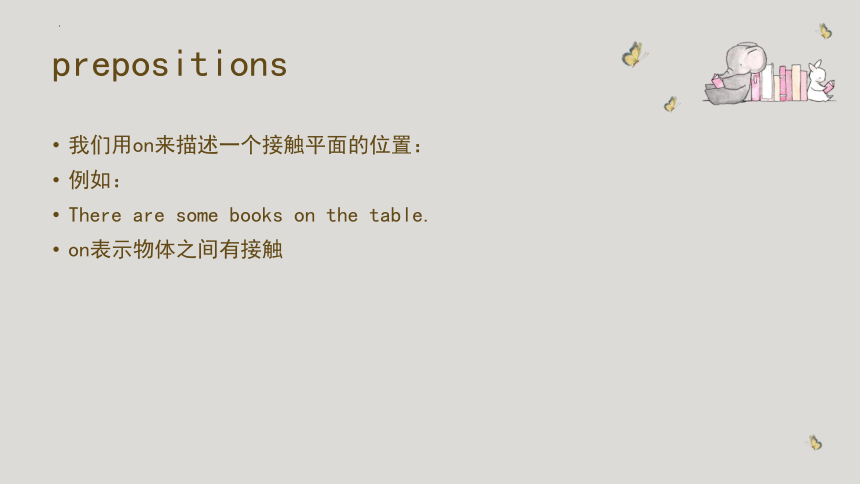
文档简介
(共18张PPT)
介词
prepositions
at的用法:
我们用at来谈论我们认为是一个点而不是一个区域的地方,以及有一群人参加的事件:
例如:
I arrived at New Street Station at 7.30.
表示一个地点
There were very few people at Joan's party.
有一群人参加
prepositions
at:用来表达时间点:
with exact points of time:
at midday at midnight at 3 o'clock at 8.15
表示短暂的假期:
with short holiday periods,
such as Christmas, Easter, the weekend, etc.:
prepositions
with other short periods that we think of as points, such as the end of January, the beginning of the year, etc.
还有一些我们认为是点的短时间,比如一月底、年初等等。
I get paid at the end of the month
with mealtimes, such as breakfast, lunch, dinner, etc.:在用餐时间
That morning at breakfast, my brother told us he was getting married.
prepositions
in:表示在..里面或者在一个更大的区域
例如:
There's been another big forest fire in California.
She looked again in her bag and, to her relief, there were her keys.
prepositions
when we talk about longer periods of time such as seasons (e.g. the spring), months, years,decades (e.g. the 1990's (or the 1990s)), centuries (e.g. the 16th century), and other periods
当我们谈论较长的时间,如季节(如春天)、月、年、年(如20世纪90年代)、世纪(如16世纪)和其他时期时
such as the week before Easter, the hours before the exam, etc.: )
In the winter you can only use the road with a four-wheel drive vehicle.
In the days that followed her operation, she spent a lot of time in bed.
prepositions
我们用on来描述一个接触平面的位置:
例如:
There are some books on the table.
on表示物体之间有接触
prepositions
We use on when we talk about a particular day, date, or part of a particular day: 当我们谈论特定的一天、日期或某一天的一部分时,我们使用on:
We're meeting again on Friday.
It's her birthday on the 21st.
I get paid on the last day of the month.
We went to a party on Easter Sunday.
I've got a meeting on Monday morning
prepositions
We don't use at, in or on before (the day after) tomorrow and (the day before) yesterday:
我们不用at, in或on before(后天)tomorrow和(前天)yesterday:
The weather was beautiful yesterday, (not ...on yesterday.)
We prefer What time... rather than At what time...
except in very formal English.
prepositions
During, for, in, over, throughout We use during or in to talk about something that happens within a particular period of time:
我们用During或in来谈论在一段特定时间内发生的事情:
The population of the city has actually fallen during the last decade, (or ...in the last...)
She didn't take a holiday during her four years as head of the company, (or ...in her four years...)
During the time that I was in Paris, I only once saw the River Seine, (or In the time...)
prepositions
We use during rather than in when we talk about something that happens within the same time as another event or activity rather than over a particular period of time:
当我们谈论与另一事件或活动在同一时间内发生的事情而不是在一段特定的时间内发生时,我们使用during而不是in:
Mrs Newton came into our classroom during a maths test. The President made the speech during a visit to Madrid.
prepositions
We also prefer during when we emphasise that something continues for the whole of a particular period of time:
当我们强调某事在一段特定的时间内一直持续时,我们也更喜欢用during:
No-one was allowed to leave the ship during (the whole of) its time in port. We can also use throughout to express a similar meaning:
船在港期间(整个)期间不允许任何人离开。我们也可以用through来表达类似的意思: We had enough firewood to keep us warm during (the whole of) the winter, (or...warm throughout the winter.)
prepositions
我们可以用across或over来谈论在桥、路、边界、河流等的另一边或到达另一边的位置:
例如:
The truck came towards them across/over the bridge.
Mike lives in the house across/over the road from ours.
Once she was across/over the border, she knew she would be safe.
prepositions
We use between with two or more people or things that we see as individual or separate.
We use among when we see the people or things as part of a group or mass.
我们用between来表示两个或两个以上我们认为是独立的或分开的人或事。
当我们将人或事物视为群体或群体的一部分时,我们使用among。
prepositions
例如:
She held the diamond between her thumb and forefinger.
Zimbabwe is situated between Zambia to the north, Mozambique to the east, Botswana to p the west, and South Africa to the south.
He stood among all his friends in the room and felt very happy. | She eventually found her passport among the clothes in her drawer.
prepositions
By, beside, close to, near (to), next (to)
These all mean 'not far away'. We can often use either near (to) or close to:
这些都表示“不远”。我们经常可以用near (to)或close to:
The plant often grows close to / near (to) the banks of rivers.
We live close to / near (to) the city centre.
prepositions
We use beside, by, or next to to say that one thing or person is at the side of another:
我们用beside、by或next to来表示一个事物或一个人在另一个事物或人的旁边:
Colin sat beside / by / next to her with his legs crossed.
I pushed the button beside / by / next to the door, but there was no answer.
Thank you!
介词
prepositions
at的用法:
我们用at来谈论我们认为是一个点而不是一个区域的地方,以及有一群人参加的事件:
例如:
I arrived at New Street Station at 7.30.
表示一个地点
There were very few people at Joan's party.
有一群人参加
prepositions
at:用来表达时间点:
with exact points of time:
at midday at midnight at 3 o'clock at 8.15
表示短暂的假期:
with short holiday periods,
such as Christmas, Easter, the weekend, etc.:
prepositions
with other short periods that we think of as points, such as the end of January, the beginning of the year, etc.
还有一些我们认为是点的短时间,比如一月底、年初等等。
I get paid at the end of the month
with mealtimes, such as breakfast, lunch, dinner, etc.:在用餐时间
That morning at breakfast, my brother told us he was getting married.
prepositions
in:表示在..里面或者在一个更大的区域
例如:
There's been another big forest fire in California.
She looked again in her bag and, to her relief, there were her keys.
prepositions
when we talk about longer periods of time such as seasons (e.g. the spring), months, years,decades (e.g. the 1990's (or the 1990s)), centuries (e.g. the 16th century), and other periods
当我们谈论较长的时间,如季节(如春天)、月、年、年(如20世纪90年代)、世纪(如16世纪)和其他时期时
such as the week before Easter, the hours before the exam, etc.: )
In the winter you can only use the road with a four-wheel drive vehicle.
In the days that followed her operation, she spent a lot of time in bed.
prepositions
我们用on来描述一个接触平面的位置:
例如:
There are some books on the table.
on表示物体之间有接触
prepositions
We use on when we talk about a particular day, date, or part of a particular day: 当我们谈论特定的一天、日期或某一天的一部分时,我们使用on:
We're meeting again on Friday.
It's her birthday on the 21st.
I get paid on the last day of the month.
We went to a party on Easter Sunday.
I've got a meeting on Monday morning
prepositions
We don't use at, in or on before (the day after) tomorrow and (the day before) yesterday:
我们不用at, in或on before(后天)tomorrow和(前天)yesterday:
The weather was beautiful yesterday, (not ...on yesterday.)
We prefer What time... rather than At what time...
except in very formal English.
prepositions
During, for, in, over, throughout We use during or in to talk about something that happens within a particular period of time:
我们用During或in来谈论在一段特定时间内发生的事情:
The population of the city has actually fallen during the last decade, (or ...in the last...)
She didn't take a holiday during her four years as head of the company, (or ...in her four years...)
During the time that I was in Paris, I only once saw the River Seine, (or In the time...)
prepositions
We use during rather than in when we talk about something that happens within the same time as another event or activity rather than over a particular period of time:
当我们谈论与另一事件或活动在同一时间内发生的事情而不是在一段特定的时间内发生时,我们使用during而不是in:
Mrs Newton came into our classroom during a maths test. The President made the speech during a visit to Madrid.
prepositions
We also prefer during when we emphasise that something continues for the whole of a particular period of time:
当我们强调某事在一段特定的时间内一直持续时,我们也更喜欢用during:
No-one was allowed to leave the ship during (the whole of) its time in port. We can also use throughout to express a similar meaning:
船在港期间(整个)期间不允许任何人离开。我们也可以用through来表达类似的意思: We had enough firewood to keep us warm during (the whole of) the winter, (or...warm throughout the winter.)
prepositions
我们可以用across或over来谈论在桥、路、边界、河流等的另一边或到达另一边的位置:
例如:
The truck came towards them across/over the bridge.
Mike lives in the house across/over the road from ours.
Once she was across/over the border, she knew she would be safe.
prepositions
We use between with two or more people or things that we see as individual or separate.
We use among when we see the people or things as part of a group or mass.
我们用between来表示两个或两个以上我们认为是独立的或分开的人或事。
当我们将人或事物视为群体或群体的一部分时,我们使用among。
prepositions
例如:
She held the diamond between her thumb and forefinger.
Zimbabwe is situated between Zambia to the north, Mozambique to the east, Botswana to p the west, and South Africa to the south.
He stood among all his friends in the room and felt very happy. | She eventually found her passport among the clothes in her drawer.
prepositions
By, beside, close to, near (to), next (to)
These all mean 'not far away'. We can often use either near (to) or close to:
这些都表示“不远”。我们经常可以用near (to)或close to:
The plant often grows close to / near (to) the banks of rivers.
We live close to / near (to) the city centre.
prepositions
We use beside, by, or next to to say that one thing or person is at the side of another:
我们用beside、by或next to来表示一个事物或一个人在另一个事物或人的旁边:
Colin sat beside / by / next to her with his legs crossed.
I pushed the button beside / by / next to the door, but there was no answer.
Thank you!
同课章节目录
- 词法
- 名词
- 动词和动词短语
- 动词语态
- 动词时态
- 助动词和情态动词
- 非谓语动词
- 冠词
- 代词
- 数词和量词
- 形容词副词及其比较等级
- 介词和介词短语
- 连词和感叹词
- 构词法
- 相似、相近词比较
- 句法
- 陈述句
- 一般疑问句和否定疑问句
- 特殊疑问句及选择疑问句
- 反意疑问句
- 存在句(There be句型)
- 宾语从句
- 定语从句
- 状语从句
- 主谓一致问题
- 简单句
- 并列句
- 复合句
- 主谓一致
- 主、表语从句
- 名词性从句
- 直接引语和间接引语
- 虚拟语气
- 感叹句
- 强调句
- 倒装句
- 祈使句
- 句子的成分
- 句子的分类
- 题型专区
- 单项选择部分
- 易错题
- 完形填空
- 阅读理解
- 词汇练习
- 听说训练
- 句型转换
- 补全对话
- 短文改错
- 翻译
- 书面表达
- 任务型阅读
- 语法填空
- 其他资料
